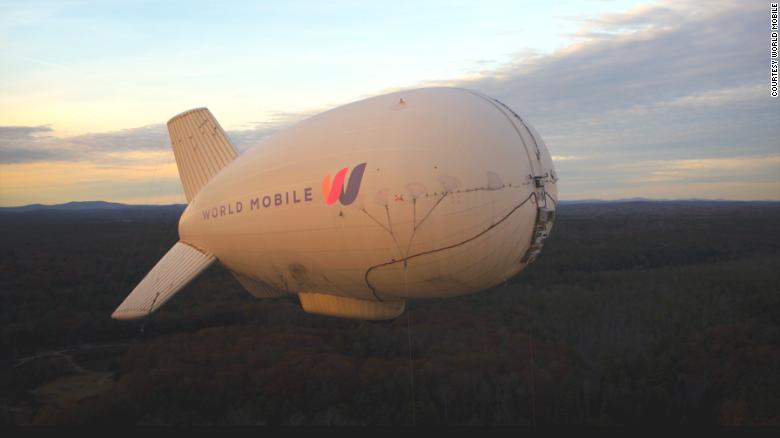Infrastructure projects reshaping Africa 0:59
(CNN) -
The islands of Zanzibar and Pemba in Tanzania are about to become a test site for a mobile Internet network that its creators hope will not only revolutionize life there, but possibly throughout sub-Saharan Africa and more. there.
According to the World Bank, only 20% of Tanzanians use the Internet.
This figure is low, even for sub-Saharan Africa, where usage is affected by limited internet coverage and exacerbated by high data costs and low digital literacy.
However, the change could come soon.
These are the 5 most visited internet sites in the world
British company World Mobile will launch a hybrid network using hot air balloons, balloons similar to airships that it says will provide near-total coverage on the islands.
Two balloons filled with helium and powered by solar energy will float 300 meters high and have a transmission range of about 70 kilometers each, using 3G and 4G frequencies to emit their signal. The balloons can survive winds of up to 150 kilometers per hour and stay in the air for up to 14 days before descending to fill them. In the few hours of inactivity, other hot air balloons will be deployed, thus ensuring that users are never without service, the company says.
The signal from a hot air balloon, used as a low altitude platform station (LAPS), is sufficient for tasks like surfing the Internet and checking email, World Mobile says.
Meanwhile, a network of land-based nodes is being built, each capable of providing WiFi to hundreds of people with sufficient speeds for streaming video and gaming.
The network, with 125 locations, is scheduled to be completed this year and the first balloon to launch in June.
Workers install a World Mobile node while building its ground-to-air network.
"Zanzibar represents a really interesting opportunity," World Mobile CEO Micky Watkins told CNN.
"There are about a million and a half people on the islands. It is like a small country."
advertising
Where others have failed
World Mobile aspires to succeed where other, larger companies have failed.
Facebook's Aquila project, a high-altitude drone internet delivery system, closed in 2018. Loon, which used stratospheric balloons to provide internet connectivity, and was part of Google's parent company Alphabet, withdrew in January 2021.
The Aquila and Loon project were designed to provide the Internet to remote areas using high altitude platform station systems (HAPS).
Loon was used in disaster relief efforts, including in the aftermath of Hurricane Maria, which hit Puerto Rico in 2017 (Loon partnered with CNN's parent company AT&T) and was also commercially tested in Kenya in 2020.
Derek Long, head of telecommunications and mobile at technology advisory firm Cambridge Consultants, says Loon and Facebook were unsuccessful because they were unable to run the economics of their systems, among other factors.
However, he says, "a hybrid model can be fine-tuned to overcome this by offering high-capacity ground solutions in highly populated areas and lower-cost coverage solutions with non-ground platforms."
Facebook gives up its plan to build Internet drones
Long says that while the hot air balloon novelty "may itself create some resistance to market acceptance," a hybrid ground-to-air model, if "seamlessly integrated", could be the "best solution for the challenge in question ".
World Mobile is also conducting experiments with HAPS technology, but will not wait for the results, but will deploy its hot air balloons and terrestrial WiFi network first.
"It would be foolish to spend three or four years researching (and) developing the entire network solution without deploying what we know we can now deploy," says Watkins.
Hot air balloon designer Altaeros partnered with World Mobile to supply the balloons used to deploy part of its network in Zanzibar
The value of connectivity
Sara Ballan, Senior Digital Development Specialist at the World Bank, says that connectivity in Tanzania has an economic impact on a personal and national level.
"For a farmer, connectivity can open access to weather information, market prices and facilitate payment flows. For the economy, digital transformation is an engine of growth, innovation, job creation and access to services. ", Explain. "Unlocking this potential is important for society at large, but especially for the growing youth population seeking employment and opportunities."
Ballan notes that connectivity is only part of the solution: "We are optimistic that, within a few years, innovations (in telecommunications) will fill important gaps in connectivity (in sub-Saharan Africa) ... However , affordability remains a key issue, and innovative business models will continue to be needed to connect poor populations. "
The cost of deploying the network in Zanzibar is many times less than that of legacy infrastructure, says Watkins, and World Mobile aims to provide connectivity for half the price of existing operators.
World Mobile recently raised $ 40 million for software development and initial network deployment, the CEO says.
The company owns the network and the license to use it in Zanzibar, but Watkins says it expects citizens to be able to buy 70% of the WiFi nodes, to manage and maintain the network node infrastructure and obtain income from her.
It's an unusual business model, Long says, in a market categorized by a small number of large multinational operations.
"If World Mobile can be successful in such a market, where there are already several large incumbents, it bodes well for the future," Long says.
In addition to World Mobile's operating licenses in Zanzibar and Tanzania, Watkins expects a license to operate in Kenya to be obtained earlier this year, adding that the company has reserved another 18 countries for its system.
As we enter a crucial year for the company, Watkins is optimistic about the prospects for World Mobile.
"If we can make the sharing economy work well in Zanzibar, we will demonstrate it on a large scale in Kenya and Tanzania, and then the rest of the world will be ours," he says.
Internet








